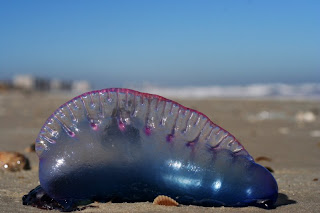
Since I'll be traveling at the end of this week (unfortunately not to the ACS meeting), I decided to post something relevant to my destination. According to the people I'm visiting, there is currently an infestation of Portugese Men-of-War on the beaches and in the surrounding water of this sunny locale. As I consider myself equal parts organic chemist and chemical biologist, I thought that this might make for an informative post. Interestingly, the Portugese Man-of-War is a siphonophora; thus, it is a colonial species, made up of four different types of polyps. While each is an individual, they are completely integrated with each other and the colony is often mistaken for one large jellyfish. Its tentacles can be up to 50 meters long! Although I couldn't find much information about the chemical composition of Physalia physalis venom, I did learn that it consists of ATPase, RNase, AMPase, and nonspecific aminoesterases [1], most of which work to degrade cellular content, producing extreme pain in the process. 28% of the venom protein consists of physalitoxin, which is a large heterotrimeric glycoprotein that hemolyses mammalian erythrocytes. Cells treated with man-of-war poison generally release histamine. Research has shown that the venom itself creates pores in the cell membrane, allowing for the free transport of mono- and divalent cations [2], which has a major impact on the cardiac system of poisoned animals. Usually man-of-war stings are not fatal to humans, unless one is stung while swimming in extremely deep water. According to many websites, treatment with either hot or cold water best relieves pain from stings, while vinegar may cause the tentacles to release more venom, and should be avoided.
Can anyone guess where I am headed?
photo taken from: Lilactree
Also, I shouldn't fail to mention that Richet won the Nobel Prize for his work with the Portugese Man-of-War, in which he discovered and characterized anaphylaxis (an extreme allergic reaction).
Can anyone guess where I am headed?
photo taken from: Lilactree
6 comments:
Not much for anything biological, but I've wondered what was in man-o-war venom. Hmmmmm. (you're linked, by the way :) )
We get a lot of those in Australia when the wind blows in the right (wrong) direction for a couple of days. I find the best way to stop the pain is to ignore it: if you dont touch/poke/rub/scratch the site of the sting it goes away much quicker.
Does touching the top, blue, floaty part of a man of war hurt you? Or is it just the tentacles??
Anonymous,
Don't take my word for it--but I saw some children playing with the Portugese men-of-war that had washed up on the beach. They were throwing them around carefully, holding on to the top part only. From this observation I would say that only the tentacles would sting, but I'm certainly not an expert.
Way of life the watchword correctly--simply One proverb about youngsters having fun with the actual Portugese workforce-associated with-warfare which have water-washed on your beach front. We were holding putting together all of them close to cautiously, holding on to the most notable office but. Out of this observance I'd suppose that will only the tentacles might pang, only I'm most certainly not a pro.
http://2usogames.com/
http://rsonlinegame.com/
These people
Diablo III Goldwere organizing them around thoroughly, holding on to the superior portion just. With this statement I would point out that merely the tentacles would likely hurt,Cheap Guild Wars 2 Goldhowever I am just most certainly not an authority.
Post a Comment